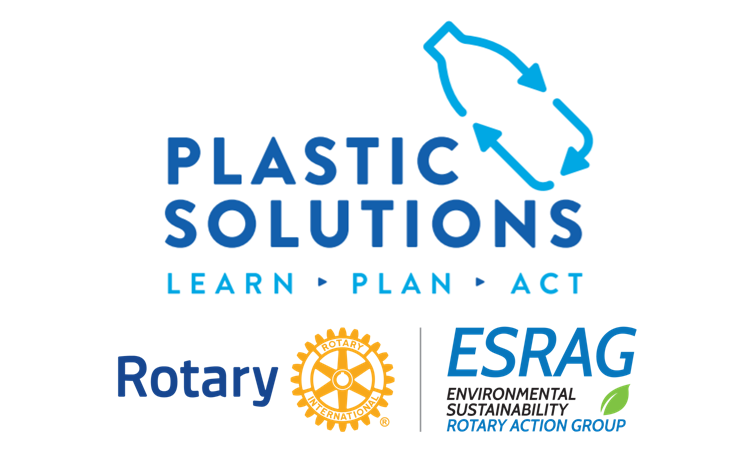
We see a world where people unite and take action to protect the environment for a sustainable future.
Environmental Sustainability Rotary Action Group (ESRAG) inspires and empowers the Rotary Family with extensive expertise, networks, education and best practices to implement sustainable and impactful environmental projects. These projects promote environmental sustainability, awareness of climate change, and actions to reduce greenhouse gas emissions and to mitigate climate disruption.
Since the 1950’s, plastic has exploded into our lives, changing it in ways that are big and small. From entire beaches and rivers covered with plastic, to nanoplastics in human blood, plastic is filling our lives — outside and in.
Dealing with the discarded plastic we already have is a daunting project, but the amount we create each year is rising. We created half of the plastic in the world in the last 15 years, and will double new plastic production by 2030. There is a mountain of plastic coming our way, disguised as fabric, hiding in food, packaging our stuff, being our stuff…
The Plastic Solutions Task Force is a group working within ESRAG, with a mission to reduce the amount of plastic waste in the world, and it is open to all ESRAG members.
The ESRAG Plastic Solutions Task Force wants to reduce the threat caused by plastic waste by understanding its root causes, and promoting the best solutions. From emerging technologies to simple reduction; from individual behavior change to systemic global change, some solutions are out there, and some are being invented. Rotarians can use their enormous networking power to influence how we create, use and dispose of plastic.
Mission & Approach
The ESRAG Plastic Solutions Taskforce is leveraging the power of Rotary to develop a global network to rethink and influence how we create, use, and dispose of plastic.
Plastic Solutions First Year Goals: Collect, Share and Help
- Collect and share program, project, and event examples, provide education and resources, and help Clubs learn, plan, and act to reduce plastic waste.
- Deploy tools in support of the first goal:
- Launch a newsletter to share projects and provide links to basic plastic information, important plastic research and resources.
- Produce 4 webinars exploring difficult and complex plastic issues
- Launch and promote a Plastic Solutions Speakers Bureau for Club and District presentations
In the process of creating these tools, members can begin to connect, collaborate and discover best practices. During that process, and with project tools launched and functioning well, the task force will be in a position to identify interventions and design campaigns to promote adoption by interested members and clubs.
Project Categories: To help Clubs and Districts find projects, programs and events that best match their interests and needs, Plastic Solutions will index projects by category. Projects will often fall under more than one category, and Clubs will be encouraged to progress from simpler to more impactful projects. After one year, the categories can be evaluated and changed as needed:
- Cleanup Activities – Gateway events to energize Club members, launch community collaborations, create awareness, and lead to more impactful activities.
- Data Collection – Adds a layer of data gathering to cleanup projects through global data collection apps such as Literati or Clean Swell, or through research collaborations.
- Landfill / Incineration Diversion – Projects that reduce plastic use, or Reduce, Reuse, Recycle, Rot and Zero Waste
- Economic Development – Plastic waste projects with job creation/humanitarian components.
- Individual Behavior Change – Encourages individuals to reduce plastic use through and may use education campaigns, pledges, usage calculators.
- Systemic and Global Change – Manufacturing, Regulatory, Taxation and Advocacy Programs that identify and address root causes of plastic waste.
Global Grants
On 9th May 2022, ESRAG’s Plastic Solutions Task Force invited members to learn about global grant development from a master, Rotarian Prakasam (Prakash) Tata, PhD, BCES QRP (Emeritus)
Prakash has been working as an environmental engineer for 60+ years. He received his PhD in Environmental Sciences from Rutgers University in 1966, and served on the faculty of Cornell University until 1974. He joined the Metropolitan Water Reclamation District of Greater Chicago and retired in 2002 to do voluntary and consulting work. Prakash is a member of the Rotary Club of Naperville, Illinois, and currently serves as the Executive Director for the Center for Transformation of Waste Technology, a nonprofit organization. He has published dozens of articles and continues to consult with and advise cities, industries, and NGOs on projects in his field, internationally and locally.
Dr. Tata spoke about his recently-approved grant on Plastic Waste Collection, Processing, and Recycling and Reuse, which will be implemented in the coastal city of Viskhapatnam, Andhra Pradesh, India. The grant is already fully funded, and Prakash shared advice, challenges faced, and lessons learned.
Check out the video below for Dr. Tata's informative and valuable insights on accessing Global Grants for Plastic Solutions
For more information on ESRAG, visit: https://esrag.org
For more information on the Plastic Solutions Task Force, visit: https://www.esragplastics.org